

Who were the people who came to Australia and why did they come? The Dismissal, Australia's constitutional crisis - 80 Days That Changed Our Lives - ABC Archives. The Dismissal (1 of 5) Of Gough Whitlam On 11th November 1975. How the Whitlam dismissal came about. The dismissal of Gough Whitlam's government by Governor-General Sir John Kerr in 1975 remains one of the most divisive events in Australian politics.
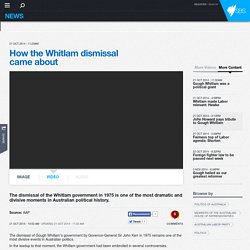
In the leadup to that moment, the Whitlam government had been embroiled in several controversies. Most damaging was the Loans Affair. Minerals and Energy Minister Rex Connor, whose visions were as huge as Whitlam's, wanted to borrow $4 billion in petrodollars through funny-money operative Tirath Khemlani to finance his massive power projects. Despite treasury opposition, the loan was approved in questionable circumstances by executive council. The money never came through, the opposition and the media became increasingly critical and eventually Connor was sacked for misleading parliament. All this was happening against a worsening economy, with inflation and unemployment rising.
Toogoodr01/vxlhmecn9vvl. Cate Blanchett pays tribute to Gough Whitlam: full text. Could not load plugins: File not found Cate Blanchett's Whitlam tribute Actress Cate Blanchett applauded as she reflects on growing up in a world greatly changed by former Labor prime minister Gough Whitlam. 5, 2014 When I heard Gough Whitlam had died, I was filled with an inordinate sadness.
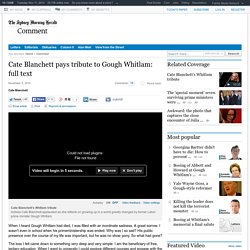
A great sorrow. The loss I felt came down to something very deep and very simple. I am the product of an Australia that wanted, and was encouraged, to explore its voice culturally. Cambodia: Demining transforms former battleground into field of hope. Cambodian farmer Prak Chrin, third from left, plants green bean seeds on her new land that has recently been cleared of landmines in Samlot district, Battambang province.
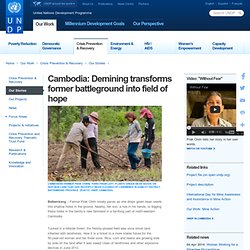
(Photo: UNDP Cambodia) Battambang – Farmer Prak Chrin slowly paces as she drops green bean seeds into shallow holes in the ground. Nearby, her son, a hoe in his hands, is digging these holes in the family’s new farmland in a far-flung part of north-western Cambodia. Tucked in a hillside forest, the freshly-plowed field was once shrub land infested with landmines. Now it is a ticket to a more stable future for the 50-year-old woman and her three sons. “I am so glad to finally be able to use the land for crops,” Prak Chrin says. She has lived for the past 20 years in O Tatiek village in Samlot district, Battambang province, located about 400 kilometres north-west of Cambodia’s capital city, Phnom Penh. The Stolen Generations’ Testimonies - About Stolen Generations. About this Project The ‘Stolen Generations’ Testimonies’ project is an initiative to record on film the personal testimonies of Australia’s Stolen Generations Survivors and share them online.

The Stolen Generations' Testimonies Foundation hopes the online museum will become a national treasure and a unique and sacred keeping place for Stolen Generations’ Survivors’ Testimonies. Vietnam War - Martin Gitlin. Vietnam War POWs - Danielle Smith-Llera. The Split — The Petrov Affair. Factbox: What is Sorry Day?
On 26 May every year, ceremonies, marches, speeches and presentations are held around the country to commemorate Sorry Day, the day on which Australians express regret for the historical mistreatment of Aboriginal people.
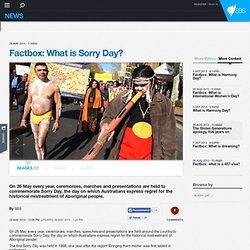
The first Sorry Day was held in 1998, one year after the report 'Bringing them Home' was first tabled in parliament. The report, which resulted from a Human Rights and Equal Opportunity Commission inquiry, documented the forced removal of many Aboriginal and Torres Strait Islander children from their families, between 1910 and the 1970s. After 30 years of denial come tears of relief - National - smh.com.au. Apology and unfinished business. WARNING: This website contains confronting and disturbing content, and names and images of deceased people.
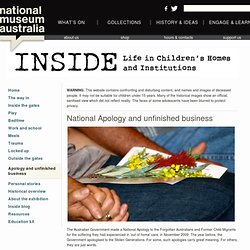
It may not be suitable for children under 15 years. Many of the historical images show an official, sanitised view which did not reflect reality. The faces of some adolescents have been blurred to protect privacy. Stories of Stolen Generations. Koorie Heritage Trust. Stolen Generations (2000) clip 1 on ASO. Mabo and Wik lesson 1. Mabo/Terra Nullius/The Mabo Case. By the beginning of the 1980's some legal observers believed that if the right case was brought to the High Court there might finally be, in Justice Deane's words, a "retreat from injustice" in Australia, similar to that which had been reached in American law in the 1820's and 1830's.
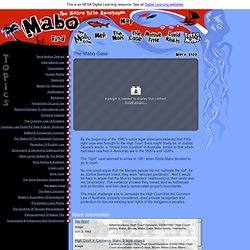
The "right" case seemed to arrive in 1981 when Eddie Mabo decided to go to court. After Mabo (1997) clip 1 on ASO. Mabo/Native Title/Wik & Co-Existence. In 1996, the Wik and Thayorre people of Queensland claimed native title over land that was also covered by pastoral leases.
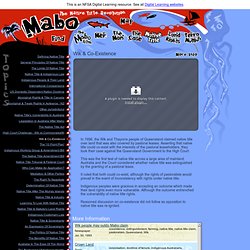
Asserting that native title could co-exist with the interests of the pastoral leaseholders, they took their case against the Queensland Government to the High Court. This was the first test of native title across a large area of mainland Australia and the Court considered whether native title was extinguished by the granting of a pastoral lease. It ruled that both could co-exist, although the rights of pastoralists would prevail in the event of inconsistency with rights under native title.
Indigenous peoples were gracious in accepting an outcome which made their land rights even more vulnerable. The Mabo legacy. The Samuel Griffith Society: Volume 8: Chapter Twelve. S E K Hulme, QC.
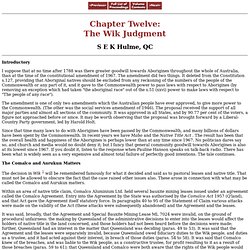
From Dispossession to Reconciliation. Research Paper 27 1998-99 John Gardiner-Garden Social Policy Group 29 June 1999 Contents Major Issues Introduction.
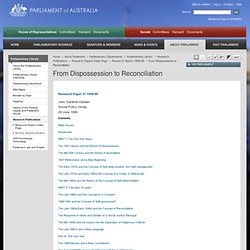
SBS: First Australians. EPISODE 6 - A fair deal for a dark race EPISODE 6 - A fair deal for a dark race | Sunday 16 May at 8:30pm. Harold (1994) clip 2 on ASO. Teacher’s notes provided by This clip shows interviews with Harold Blair’s wife Dorothy Blair, her sister Florence Trevail, and Harold’s sister Meryl Thompson. Missions NSW. A complete list of NSW government Missions and Reserves is contained in Connecting kin : guide to records [PDF 1.4 MB], Appendix 3. pages 338-340 from which the below is quoted. "Missions were compounds established by the churches as a sanctuary to 'protect' the Indigenous peoples of Australia from the mistreatment that the European settlers were perpetrating on them.
They were institutions that arguably had a detrimental influence on the very people they were supposed to protect. Aboriginal Mission Stations and Reserves in Victoria. Significant Events. Koorie Heritage Trust. Couldn’t Be Fairer (1984) clip 1 on ASO. Teacher’s notes provided by This clip shows black-and-white archival footage of Indigenous Australians engaged in traditional ceremonial activities, building a shelter, fishing with spears and collecting food. Collaborating for Indigenous Rights 1957-1973. Overview Title: Investigating the changing rights and freedoms of Indigenous Australians, 1957-1975Topic: History, Civics and Citizenship, Society and Environment, Indigenous Studies, English, Media StudiesType: Curriculum materialsYears: 8-12 Key curriculum links: Time, Continuity and Change; Culture; Natural and Social Systems; Investigation, Communication and Participation, Thinking Processes and Communication.